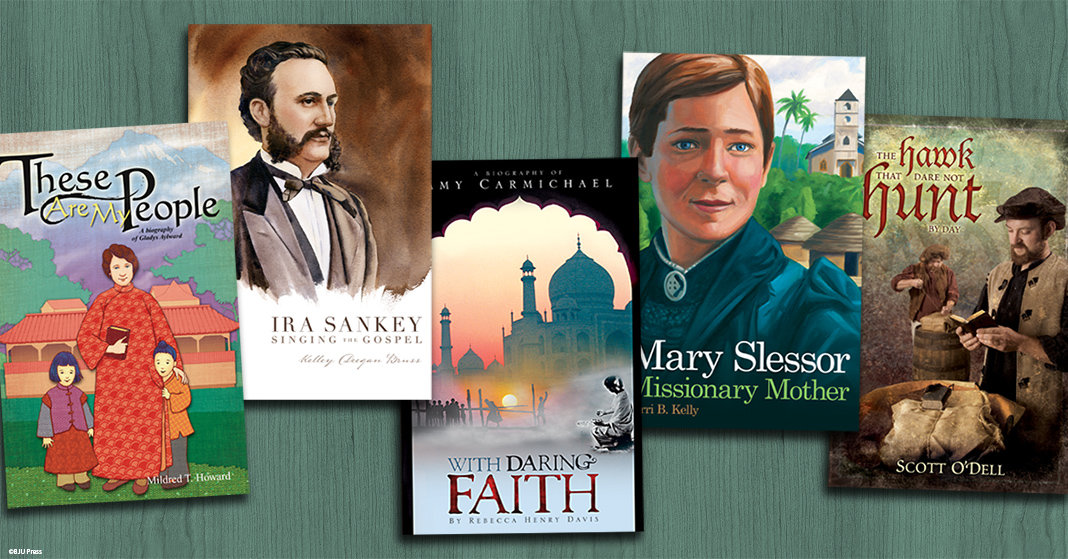
Most homeschool parents realize the value of using biographies as a teaching tool to complement what their kids are learning. By reading biographies, your child can gain a much better understanding of how the people of a specific time period walked, talked, dressed, worked, and played; however, there is another important use for biographies—the teaching or reinforcement of Christian principles. As Jonathan Edwards put it, “There are two ways of representing and recommending true religion and virtue to the world—the one, by doctrine and precept; the other, instance and example.”
Biographies in Your Homeschool
While your child is reading about a particular historical era in Heritage Studies, introduce a book about one of the notable figures of that time. The biography might be about a Christian statesman or a missionary who served during that era. A biography of a notable scientist, such as Madame Curie, might pair well with your child’s studies in chemistry. A book about a brilliant Christian mathematician might inspire your child to strive for excellence in algebra.
Homeschool families can use biographies to reinforce their teaching of the Bible on almost any grade level. For example, if the child is reading in Acts about the missionary journeys of Paul, he can read some stories from the lives of famous missionaries including William Carey, Adoniram Judson, or John and Betty Stam.
The Popular Biography
To keep the kids engaged, it’s a good idea to choose “popular biographies” close to their grade level. These biographies draw information from reliable secondary sources and then dramatize the stories a bit with description and dialogue. A popular biography is designed to be a story about real-life events, rather than a report.
One example of a popular biography is With Daring Faith by Rebecca Davis. This book, written for children ages nine to twelve, focuses on a central theme—the faith that spurred Amy Carmichael to serve on the mission field of India. The biography handles Amy’s rescue of enslaved children with delicacy so that children can become familiar with the story and learn from it at an age-appropriate level. Another biography for the middle grades is Mary Slessor: Missionary Mother about the tough Scottish missionary to Africa. For younger readers (ages seven to nine), consider These Are My People about the life of Gladys Aylward
The Fictionalized Biography
Fictionalized biographies center on genuine historical figures but include fictional characters and dialogue. The Hawk That Dare Not Hunt by Day by Scott O’Dell is a work of historical fiction about the life of William Tyndale suitable for teens.
The Critical Biography
Another kind of biography is the critical biography. The book doesn’t necessarily criticize its subject; the term critical means that the work is based on original sources such as letters, papers, or interviews and contains scholarly citations. A critical biography concentrates on presenting all aspects of its subject, good and bad. Parents and teen homeschoolers can enjoy reading and discussing critical biographies such as Merle d’Aubigné’s The Triumph of Truth: A Life of Martin Luther.
Fill up your family library with informational books as well as good fiction, and add in some quality Christian biographies. Stories of faith in action will provide your students with real-life illustrations of scriptural truth.
• • • • •
Rebecca is a work-at-home freelance writer, novelist, wife, and the mom of two bright-eyed little ones. She credits her success in writing and her love of books to her own mom, who homeschooled three kids from pre-K through high school.
 “My son can already write his name!” says a proud mother. “My daughter is not quite four, and she has just learned to read!” says another. One mom shrinks back into her seat, wondering if she’s doing something wrong. Should her son or daughter be reading at age three or four? Should her two-year-old be learning to form the shapes of letters?
“My son can already write his name!” says a proud mother. “My daughter is not quite four, and she has just learned to read!” says another. One mom shrinks back into her seat, wondering if she’s doing something wrong. Should her son or daughter be reading at age three or four? Should her two-year-old be learning to form the shapes of letters?